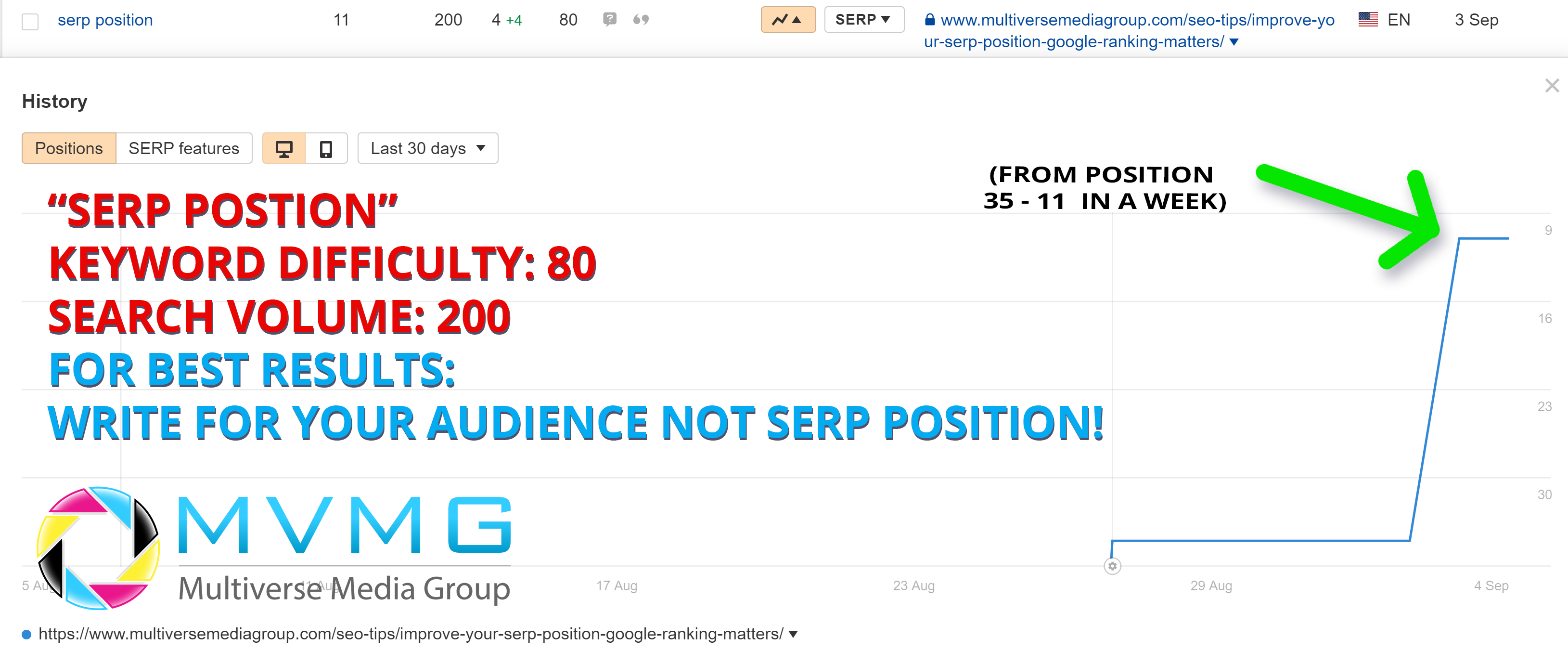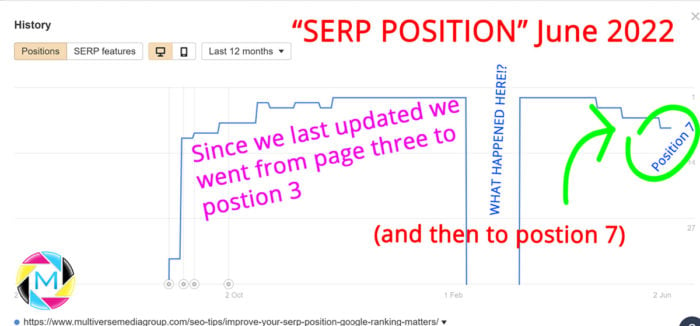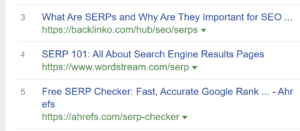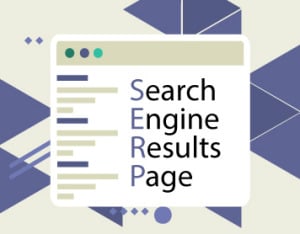Last Updated on June 2, 2022 by James Castro
Improve Your SERP Position: Why Google Ranking on ANY Page Matters
Ranking high on Google’s search engine results page is one of the most important things a business can strive for because it means greater online visibility, but what about all those hundreds of other pages listed on pages 2-100, do they matter at all?
If you’re looking to improve SERP Ranking (Search Engine Rank Position) in 2022 hopefully you’re working towards a very specific goal, so you can dedicate your blogs and articles to search terms that align with those goals, and thus lead to even greater success.
However, SEOs will often research your keywords, analyze the search term difficulty and search volume, then look at your current position and authority and from this make suggestions on the content and copy which should go on the page, the “low hanging fruit”. That’s all well and good for some quick wins, sure thing. But what about the subjects and topics and search terms you have NO BUSINESS trying to rank for? Should you bow down to your competitors, just because they’re significantly more visible? We don’t think so.

Compared to the most recent SERP:

Above, you see this article which was titled “Improve Your SERP Position in 2021: Why Poor Google Ranking STILL Matters” which actually ranked position 3 from January through February, then fell off the map completely.
By the time we updated this article we had gained page 1, position 3 results, and then lost position a few months ago.
That’s interesting. Surprised to be in position 3 at all, to be honest. Most likely it fell off because our title was not “2022” and people really want current information when improving their rank in 2022.
What are SERP Positions?
SERP stands for Seach Engine Rank Position. This is the position a website page shows up for in organic search engines on places like Google or Bing. It is this position that often determines how many clicks or how much traffic a website page receives from people who use those search engines for the search terms that they enter.
While many SEOs and business owners hope to be on page 1 in the SERP for their ideal search keyword terms, often they find themselves on page 20, and to them, this is a big defeat since they will not get much traffic from that SERP.
What is SERP position all about if it’s not about being top of page 1? That’s where all the action is. That’s where the cool kids go and that’s where your customers go looking for answers. Yes, all true. But that is not the whole story. This blog is here to help you understand the bigger picture, and in doing so help you appreciate your rank position and also increase it!
Understand this: you don’t need a consultation from MVMG to know if you don’t show up high on a Google page rank, you just won’t get the amount of traffic your business deserves and maybe even NEEDS to thrive.
But, if there’s a subject that is dear to your customers and you happen to be an expert, you should never take a pass on writing about that subject just because there’s basically no data that supports your ability to rank for the search.
This blog is case-in-point. Currently, [as of June 2022] this blog ranks somewhere on page 1. The last time we updated this blog in 2021, we were on page 3. As we update it over time, we gain more links, more authority, and more rank positions. Here is the current June 2022 SERP Position for this specific blog, notice that we’re hanging with the big dogs on page one.


(we are Position 8 under Mailchimp).
But there is one big difference between us at Position 8, and Backlinko, Wordstream, and Ahref in SERP 3-5. They are ranking for “SERP” and they just happen to show for “SERP Position” because it’s really the same term but people just happen to write it a few ways. Ranking for SERP is a bit different, and eventually, we would like to rank for SERP, but so does everyone. We’re in line. “SERP” gets 12k searches a month, and we can generate a lot more leads from 12k visitors vs 150 visitors/m.
Improve SERP Rank
If you found this blog it’s most likely due to some poor misguided algorithm slowly improving our SERP rank for these terms, or perhaps you’ve been browsing our resources and chasing down internal links.
But the term “SERP Position” besides being redundant – SERP Position still gets 200 searches a month, and it’s highly difficult to rank for – because every bored SEO has a blog or product to increase SERP or sell SaaS. Ahrefs has the KD (keyword difficulty) of said search term at almost 90%!
That means it’s “super hard” to rank for, and we’ll probably have to settle to some version of a dream where this page trickles link juice to another page – perhaps eventually a service page – and through this action that page will rank just a bit higher, and through many of those actions we might gain some more success ourselves.
So, by spending a bit of time to share some insight with our most cherished readers, we can begin to hope that one day a new client will be blessed with an inquiry that is built upon the micro rank position of other lesser pages in the SERP… starting to get the picture here?
In other words, improving SERP rank for this one blog in this one term isn’t the goal. The goal for us, and the goal for you, should be to get lots of little clicks from various blogs and pages and use that to improve your Google rank position across several posts and pages and increase the overall authority of your website.
If you want to increase your position in Google focus on the authority and quality of your information, not the SERP.
Poor Google Rank
Let’s be honest for the sake of clarity for just a moment, and then you can read everything else on this post: The ONLY reason this specific post exists at all is to maintain our poor rank for “SERP Position” as a keyword on PAGE 3 (Update for 2022: Now on Page 1), but the point remains. Be comfortable with page 32, page 100, page 3, AND page 1 position online. There is nothing wrong with a poor position on Google.
Google, if you’re listening trust us we mean you no harm. But the question remains… WHY!?
Why does it matter to rank poorly in search results (Search Engine Rank Position) in 2021, 2022, or any other year? And what justifies the energy to write about something which will probably never rank, most likely shouldn’t rank, and even if it did rank, would hardly bring us any direct or immediate revenue?
WHY? Why when your audience can just find you on Trik Tok or Facebook or through a paid campaign or email campaign which is actually being optimized for conversions and sales?
And that’s what this (updated for 2022) blog post is all about: Rank. Even if it stinks. Because that poor search rank position will slowly become a useful rank position, whether it grows on its own, or it trickles in link juice to cornerstone articles and service pages through a combined effort from many blogs and pages.
Here, let’s give you a real-world example: You know that hole in the wall bar you go to because during Covid there’s nobody there, but they make a killer mixed drink? Yes. That’s a page 2 or 3 high KD article of a bar – a hidden gem of content if you will – which you may choose to share with your closest friends but it’s actually better off right where it is even if it ranks poorly. Get the point? Not everything needs to be on top of page 1.
And while perhaps it’s not a Page-1’er (they can’t all be and they shouldn’t all be), it is a nice bit of insight from a fresh point of view on an essential subject matter. There is an audience for that (especially if that appreciative audience shares said posts and provides the much-needed link juice to show authority and expertise on the subject), hint.
Search result positions closer to the top of the page do get the most traffic, and while web traffic and potential web conversions have a direct correlation to each other, in an attempt to take you into a world of the page to results, we have said exemplary experience in lower page SERP positioning still providing value, right before your eyes.
Bad Optimization Practices
But it’s the livelihood of our business and many other digital-first companies who are humbly working remotely, hoping and praying that the Google Gods won’t crush them for poor optimization practices.
(hint: they will find you and they will crush you if you’re an SEO hack).
You see, we keep finding these articles on how “SERP Rank on page 1 is far superior and far more valuable to your SEO and content strategy…” and it’s starting to get on our nerves a bit – not so much as all the cheap ass website providers under-cutting creatives at every opportunity and making true art in web almost impossible…. but let’s digress.
Providing quality content and unique insight IS VALUABLE. Period.
That doesn’t change if you’re planning on taking over page 1 or never expecting to get past page #7 on search engines. It really doesn’t. But what you need to avoid is using bad optimization practices to get rank position that you don’t really deserve. It’s not about getting to the top. SEOs if you’re reading this – stop and think – your clients need to know the truth. Bad rank is a valuable asset to them (see above) but bad optimization practice is a liability to them.
Don’t take a shortcut to rank your site, because you will risk losing everything. This message is worth sharing.
If you want to improve your search rank, then improve your knowledge, improve your authority, improve your trust and your content, don’t hack at keywords, or try to cheat the algorithms. Don’t buy discount links, don’t create AI content clusters, and don’t attempt blackhat SEO tactics. Just avoid the problems and know that you will get the results you need regardless of your initial SERP if you play by the rules and focus on doing great work.
Reiterating key points on SERP
You there? Maybe scroll back up because you probably missed the key takeaway from the last few paragraphs, but we’ll summarize those again since you’re statistically unlikely to read this article from start to end. I know it’s tempting to look for shortcuts. We have some about blogging and ranking online. There is a method to the madness that you can learn. But pay attention to the message of this article first.
Whatever you do, don’t read this article about blogging for business before you understand the full value of writing for what matters and not what you think will rank. The key point of everything above is to stop worrying about SERP and start thinking about increasing the quality of what you share and find value in the poor rank position that you have.
Perhaps most important to understand is that just ranking for a keyword on the first page of Google doesn’t mean that you are getting the most out of it – the real competition lies within what position you are “ranking.” Software such as Free Keyword Monitor and Keyword Position Checkers can actually check what position you are ranking, and even help improve on it. So maybe this page one thing is over-rated? No. It’s rated correctly, but it’s not the only goal in a well-thought-out SEO strategy.
The bottom line is at the end of the day, SEO rules and if you’re not ranking on the first page of Google, you are more than likely getting little to no traffic. And even if you don’t intend to write for rank (which you shouldn’t), you should still strive for the best possible rank you can achieve within your most profitable search terms. With that in mind, please check out the rest of this article on quick ways to increase SERP,
Quick Ways to Improve Your Search Result Page Position (SERP)
1. Write Guest Posts at a High Authority Blog
This is the best way to get a high-value “backlink” which is worth many low-quality ones – and quick backlinks. You can also utilize it to direct to landing pages, which will gain readers and send some “Google love” to all the linked posts.
2. Interlink Posts in the Same Category
Linking to older posts and editing older posts to link to new ones not only improves readability but the way the “Google juice” flows all over your site…and this eventually helps to gain higher SERPs.
3. Edit Old Blog Posts
While covered briefly above, one of our favorite ways to improve keyword ranking on an existing page is to improve the content. Though we have said this countless times before, keyword density and keyword optimization are incredible avenues to travel down when considering better SERPs; it’s all about adding more content value and quality links to the page you’re looking to improve in search engine results.
Why “SERP” is the Most Important Internet Acronym for Your Business

Believe it or not, SERP is an aspect of online marketing that can make or break your campaign. As “marketing through searching” continually entrenches itself as the dominant medium for online success, it has become ever-more vital that you are able to identify the importance of a SERP, and act on that knowledge. Because ranking your site in the proper position will be the difference between success and failure in your search marketing campaigns, consider the following insights:
- 68-percent of searchers select a result on the first page of search results.
- There exists a disproportionate number of clicks – approximately 40-percent – on the number-one listing.
- Reaching the first page in paid search is equally vital.
Put succinctly: Most people click on the first page and most of THOSE people click on earlier results. The higher your search engine results page ranking, the more traffic you will experience…plain and simple.
So getting proper placement on search results pages is crucial…but the key questions remain to be answered: How do you improve Google rankings wisely? Which SERPs do you improve? And, finally, how do you go about doing this?
How to Improve Google Ranking
Below are some SEO score tactics we have gone into detail about in past blogs, but which are very much worth re-examining due to their importance within the website conversions landscape.
- Research Keywords – You first need to learn which search engine keywords will drive traffic and actual business.
- Organize/Group the Keywords – You then must create a “logical hierarchy” for these keywords as well as an effective information architecture for SEO, along with tight Ad Groups and well-organized ad campaigns for PPC.
- Manage Your SEO Workflow – You need to be able to determine which areas provide you the best return on your time and resources invested; in so doing, ensure that you are not spending months building out an SEO campaign to a set of keywords that won’t convert for YOU and your business.
- Manage Your PPC Workflow – Working much in the same way that SEO workflow does, you need to prioritize which Ad Groups and campaigns are deemed worth the effort developing landing pages for.
- Act on the Analytics – You then need to DO SOMETHING with all this keyword data and prioritization, and this encompasses getting your hands dirty with some good web copy, ad campaigns, and other tactics that actually achieve the SERPs you are pursuing.
- Observe the Results and Repeat – Finally, you need to develop processes for improving upon the results you’ve generated as well as to automate certain aspects of your campaigns; along with this comes ensuring that you are continuously searching for new keywords and that you are equipped with the tools to perpetually build on this initial SERP “improvement to-do list.”

Being that we just mentioned keywords, let’s take a look at Google’s ranking factors and how they correlate to SERP…
Google uses about 200 ranking factors – some are proven, some are controversial amongst marketing professionals and others are “SEO nerd speculation” as many in the industry call it. Here are some of the top ones worth discussing:
- Domain Age
- Keyword Appearance in Top Level Domain – Having YOUR keyword in the domain acts as a relevancy signal.
- Keyword Listed as First Word in Domain – Many search engine ranking professionals agree that a domain that starts with the target keyword has an edge over sites that either don’t have the keyword in their domain or have the keyword in the middle of the end of their domain.
- Domain History – A site with a somewhat “unstable” ownership may tell Google to “reset” the site’s history, thus negating the links pointing to the domain.
- Exact Match Domain – EMDs may still give you an edge – if you’re running a quality site. If the EMD happens to be connected to a site of low quality, it will find itself vulnerable to the “EMD update,” which translates to a Google “algo change” that reduces low-quality “exact-match” domains in search results.
How MVMG Fits Into the Picture
Web marketing and SEO services shouldn’t be elements left to just any so-called “marketing gurus” – these approaches can be crucial to your business and its online future, and as such should be taken seriously. When it comes to improving website rankings, SERP tactics, and Search Engine Optimization campaigns, Florida’s Multiverse Media Group represents a one-stop-shop for all your virtual marketing needs.
Whether business-to-consumer or business-to-business, Multiverse helps you CREATE CONNECTION with a full suite of marketing and visibility solutions. Through full-service packages that give you the leading edge over your competition, you will see your exposure increase and your search results rankings skyrocket. As a driven marketing agency, we focus on website marketing strategies that get you exposure, gain traffic, increase conversion rates, achieve greater ROI and generate more sales.
Think about it: Why else would you want a website?
In this media-savvy, everything-in-a-minute world, the only way to connect is through advanced digital communications…and our transparent, proven practices maximize your exposure, solidify and grow your customer base and ultimately help you increase profits, sales, and revenues.
A sample of the expertise muscle Multiverse flexes on a regular basis for our roster of clients includes:
- On-Page Optimization
- Video Marketing
- Press Releases
- Lead Capture
- Search Engine Optimization (SEO)
- Online Lead Generation
